
Richard Wayne Penniman, known professionally as Little Richard, was an American musician, singer, and songwriter. He was an influential figure in popular music and culture for seven decades. Described as the "Architect of Rock and Roll", Richard's most celebrated work dates from the mid-1950s, when his charismatic showmanship and dynamic music, characterized by frenetic piano playing, pounding back beat and powerful raspy vocals, laid the foundation for rock and roll. Richard's innovative emotive vocalizations and uptempo rhythmic music also played a key role in the formation of other popular music genres, including soul and funk. He influenced numerous singers and musicians across musical genres from rock to hip hop; his music helped shape rhythm and blues for generations.

"Good Golly, Miss Molly" is a rock 'n' roll song first recorded in 1956 by American musician Little Richard and released in January 1958 as Specialty single 624, and later on Little Richard in July 1958. The song, a jump blues, was written by John Marascalco and producer Robert "Bumps" Blackwell. Although it was first recorded by Little Richard, Blackwell produced another version by the Valiants, who imitated the fast first version recorded by Little Richard, not released at that time. Although the Valiants' version was released first, Little Richard had the hit, reaching No. 4. Like all his early hits, it quickly became a rock 'n' roll standard and has subsequently been recorded by hundreds of artists. The song is ranked No. 92 on the Rolling Stone magazine's list of the 500 Greatest Songs of All Time.

John S. Marascalco was an American songwriter most noted for the songs he wrote for Little Richard. He was born in Grenada, Mississippi and died in Los Angeles, California.
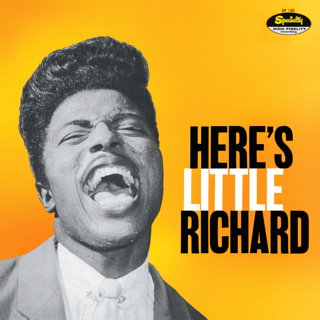
Here's Little Richard is the debut album by American musician Little Richard, released on March 4, 1957. Promoted as "six of Little Richard's hits and six brand new songs of hit calibre", the album compiles many of the A-sides and B-sides from Richard's hit singles including the Billboard top 40 entries "Tutti Frutti", "Long Tall Sally", "Slippin' and Slidin'", "Rip It Up" and "Jenny, Jenny" and the top 10 Rhythm and Blues Best-Sellers hits "Ready Teddy", "She's Got It" and "Miss Ann".
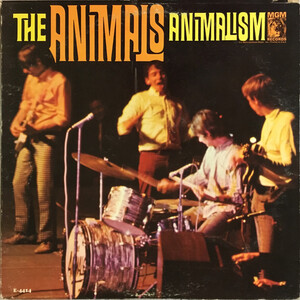
Animalism is the fifth American album by the Animals, released in November 1966. The album includes the band's usual repertoire of blues and R&B covers, while Frank Zappa contributed a song and played bass on two tracks. It was the last album recorded by the original incarnation of the Animals prior to their disbandment, after which singer Eric Burdon would assemble a mostly new lineup under the name "Eric Burdon and the Animals". This new version of the group was already touring when Animalism released.

The song "Hey-Hey-Hey-Hey", also known as "Hey-Hey-Hey-Hey! ", was written by Little Richard and recorded on May 9, 1956 at J&M Studio, New Orleans, Louisiana,.

Tutti Frutti is a song written by Little Richard and Dorothy LaBostrie, recorded in 1955, which was his first major hit. With its energetic refrain, often transcribed as "A-wop-bop-a-loo-mop-a-lop-bam-boom!", and its hard-driving sound and wild lyrics, it became not only a model for many future Little Richard songs, but also for rock and roll itself. The song introduced several of rock music's most characteristic musical features, including its loud volume, powerful vocal style, and distinctive beat and rhythm.
Robert Alexander "Bumps" Blackwell was an American bandleader, songwriter, arranger, and record producer, best known for his work overseeing the early hits of Little Richard, as well as grooming Ray Charles, Quincy Jones, Ernestine Anderson, Lloyd Price, Sam Cooke, Herb Alpert, Larry Williams, and Sly and the Family Stone at the start of their music careers.

Out My Way is an EP by the alternative rock band the Meat Puppets, released in 1986. It features a more hard rock-oriented sound than on previous releases, leading some critics to say that the sound is similar to the southern/hard rock stylings of ZZ Top. The EP was reissued in 1999 by Rykodisc, with additional bonus tracks.

"Kansas City" is a rhythm and blues song written by Jerry Leiber and Mike Stoller in 1952. First recorded by Little Willie Littlefield the same year, the song later became a chart-topping hit when it was recorded by Wilbert Harrison in 1959. "Kansas City" is one of Leiber and Stoller's "most recorded tunes, with more than three hundred versions", with several appearing in the R&B and pop record charts.

Glad All Over Again is a compilation album by The Dave Clark Five, released in 1993.

Together: Edgar Winter and Johnny Winter Live is a 1976 album by brothers Johnny Winter and Edgar Winter. Released just three months after Johnny Winter's Captured Live!, it is composed entirely of rock and roll and soul standards.

Little Richard's Greatest Hits - Recorded Live! is the second and last album by Little Richard for the Okeh label. A live album, it was recorded in the CBS Studios at Hollywood.
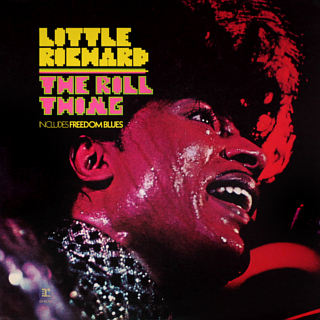
The Rill Thing is Little Richard's first album for Reprise Records, released in August 1970. It was considered a comeback album for Richard, following a three-year hiatus on new albums and an acclaimed performance at Atlantic City Pop Festival. The album utilizes a soul-influenced sound and contains Little Richard's biggest post-Specialty single in "Freedom Blues", which broke the Billboard top 50. The follow-up single, "Greenwood, Mississippi" made the top 100 and number 56 on Cashbox Black Singles. Despite the success of the singles, the album failed to chart.

Little Richard's Greatest Hits is an album of Little Richard songs re-recorded in 1964 and first released in the US by Vee-Jay Records in January 1965. It features updated versions of twelve of his best-known songs originally recorded in the 1950s for Specialty Records. Some of these re-recordings use different musical arrangements, including unusual syncopation, tambourine and jazz horns.
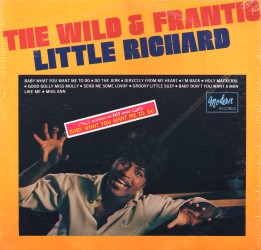
The Wild and Frantic Little Richard is the second and last Little Richard album released on the Modern Records label. It is composed of songs released on singles during his time with the label, live tracks, and material licensed or left over from Vee-Jay.. Some tracks released on 45 were different versions, shorter or longer, with or without horns and overdubs. Live material appears to be from 1 December 1965, at the Domino Club, Atlanta, Georgia. Studio from 31 August 1964, Los Angeles; 1 January 1966, Memphis.

Little Richard Live! 20 Super Hits is a recording of a live-in-studio performance by Little Richard. Recorded at the Jack Clement Studio in Nashville before an audience, the album featured remakes of twenty of his Specialty Records tracks. Counting the live takes on this album, this was the second time that Richard had rerecorded his 1950s hits in studio. These August 1976 sessions and an early 1990s session with Japanese guitarist Masayoshi Takanakka are the last times that Penniman would re-record his 1950s hits for an album before his death in May 2020. Alternate takes from these sessions are found on a full stereo "Audiophile" album from 1980.
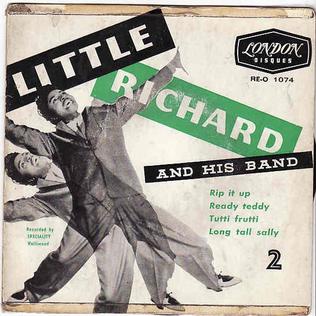
"Rip It Up" is a rock and roll song written by Robert Blackwell and John Marascalco. In June 1956, Specialty Records released it as a single by Little Richard with "Ready Teddy" as the B-side. The song reached the top position on the Billboard Rhythm & Blues Records chart as well as number 17 on the magazine's broader Billboard Hot 100. The version peaked at number 30 in the UK Singles Chart.
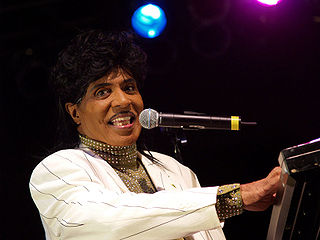
This page is a discography for American musician Little Richard (1932–2020). Described as "the architect of rock and roll", Little Richard was a pioneering singer-songwriter whose career also encompassed rhythm and blues, soul, and gospel. He began his recording career in 1951, signing to RCA Victor, releasing his first singles, and his first album in 1957, although he released his last album in 1992, he continued to tour into the 21st century. He attained international success after signing with Specialty Records in 1955.

The Everly Brothers is the 1958 eponymous debut album of close harmony singing duo the Everly Brothers. The album peaked at No. 16 on Billboard's pop albums chart and launched three very successful singles. Originally on the Cadence label, (CLP-3003), the album was re-released on LP in 1988 by EMI and on CD in 2000 by Emporio Records. It was re-released again in 2009 on 180-gram vinyl by Doxy music.



















